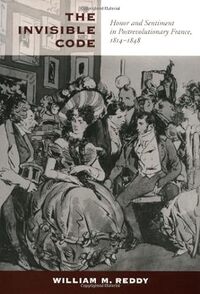- Work (Individual)
- 34. Ιστορία της Γαλλίας
- Πληροφοριακές πηγές ψηφιακής βιβλιοθήκης
- 21 March 1997
- Αγγλικά
- Reddy, William M. (1947-)
- Ιστορία
-
-
From the Inside Flap
"The Invisible Code is a carefully researched and methodologically ambitious work. Professor Reddy gives us a great deal to think about through his vivid accounts of marital conflict, journalistic confrontations, and workplace humiliation in Balzac's Paris: He argues convincingly that the records of these "ordinary" dramas can give the attentive historian access to the feelings of those involved, and that those feelings are fodder for historical analysis. While demonstrating that the collapse of Old Regime corporate institutions made way for the rise of a powerful, but invisible, code of honor in public life, Reddy challenges us to integrate the power of subjective, individual emotion into our understanding of the nature and transformation of public cultures."Sarah Maza, author of Private Lives and Public Affairs⟶ Amazon
-
-
-
Starting from the premise that private feeling cannot be contained or eliminated from public deliberation or action, William M. Reddy embarks on a fascinating inquiry into the influence of honor on behavior in nineteenth-century France. He discovers that French society was governed by a strict code of honor and that males in particular were vulnerable to acute feelings of shame, while any other feelingsreferred to as "sentiment"were considered the special domain of women. Examining the realms of both marriage and the public sphere, Reddy uncovers the feelings of shame and self-esteem, fear and desire, that entered in an unperceived yet fundamental way into the sense of self that many elite men and women worked out in the course of their lives.
⟶ Amazon
Reddy draws from archival documents spanning the disparate realms of marriage, bureaucracy, education, the fledgling profession of journalism, and literature from 1814 to 1848. Inspired by the research of women's studies and the history of gender, he explores the relationship between gender and emotion, and reveals the threads that held the social order together and gave coherence to peoples' lives and identities.
-


